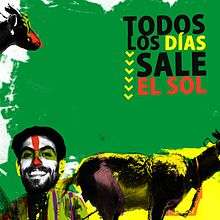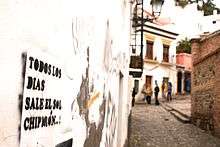Todos los días sale el sol (song)
"Todos los días sale el sol", (English: "The sun rises every day"), also known as "Chipirón",[3] is a song by Spanish alternative rock band Bongo Botrako, written by lead vocalist Uri Giné and featuring uncredited vocals by Spanish band La Pegatina.[4] It was recorded by the band for their 2010 debut studio album Todos los días sale el sol and was released as the album's first single on June 18, 2010.[5]
| "Todos los días sale el sol" | ||||
|---|---|---|---|---|
 | ||||
| Single by Bongo Botrako | ||||
| from the album Todos los días sale el sol | ||||
| Released | June 18, 2010 | |||
| Format | CD single | |||
| Recorded | April–June 2010 at La Atlántida Studio in Barcelona, Spain | |||
| Genre | ||||
| Length | 2:26 | |||
| Label | Kasba Music | |||
| Songwriter(s) | Uri Giné | |||
| Producer(s) |
| |||
| Bongo Botrako singles chronology | ||||
| ||||
| Music video | ||||
| "Todos los días sale el sol" on YouTube | ||||
The song became very popular in Spain after the men's national basketball team players, including Pau Gasol, Marc Gasol and Ricky Rubio, took the habit of singing it before every game in the EuroBasket 2011 Championship, which they eventually won.[4][6] In September 2011, "Todos los días sale el sol" peaked at #12 on the Spain Songs chart and #2 on the iTunes Spain Songs chart. The song accumulates more than 15 million streamings on YouTube[7] and more than 7 million streamings on Spotify, which ultimately makes it Bongo Botrako's most popular song by far.[8]
Inspiration
Uri Giné wrote the song in Granada, Spain, where he lived for a few months. He was inspired by a graffiti on a wall that he saw while walking around the Albayzín district. The graffiti read the optimistic phrase "Todos los días sale el sol chipirón..!".[9] In Spanish, "chipirón" means "small squid", but in this context the word was used as a funny way to refer to a person. A few days later, Giné woke up in the middle of the night with this phrase in his head and wrote the whole song in thirty minutes. Even though the lyrics aren't completely explicit, Giné once admitted that the song is mainly about sexual experiences that he had while living in Granada.[10]
Music video
The music video for "Todos los días sale el sol" was directed by Egoi Suso.[11] It was shot in Tarragona, Spain on May 20, 2011[12] and was released on June 23, 2011. In the video, frontman Uri Giné is shown singing the song as he walks down the street and meets his bandmates. He also passes through two bars, a hair salon and a bar's kitchen, and he finally arrives to a small square where he sings along with the whole band and a crowd of fans.[11] Uri Giné wanted the music video to end in this square because he used to play his songs there very often before forming the band. Actually, another song from the same album, called "La plaça de la alegría", is about this square and some stories that took place there. The real name of the square is Plaça Sedassos and it is located in the old town of Tarragona, Spain.[13][14]
Personnel
Credits adapted from the liner notes of Todos los días sale el sol.[15]
Bongo Botrako
- Uri Giné – vocals, production
- Nacho Pascual – guitar
- Xavi Vallverdú – keyboard
- David Garcia – bass
- Gorka Robert – drums, percussion
- Xavi Barrero – trumpet
- Oscar Gómez – sax
Additional musicians
- Rubén Sierra – vocals
- Adrià Salas – vocals
Production
- Mario Patiño – production, engineering, mixing
- Edgar Beltri – additional engineering
- Yves Roussel – mastering
Design
- Cristina Pastrana – design
Charts
| Chart (2011) | Peak position |
|---|---|
| Spain Top 50 (Promusicae)[16] | 12 |
| Spain iTunes Top 10[17] | 2 |
References
- "'Todos los días sale el sol chipirón' una canción con suerte". La Razón (in Spanish). October 24, 2011. Retrieved January 18, 2017.
- "Concierto de Bongo Botrako en las Fiestas de la Paloma de Madrid". Kedin (in Spanish). July 31, 2015. Retrieved January 18, 2017.
- "Bongo Botrako, los del 'chipirón'". Radio Euskadi (in Spanish). May 11, 2012. Retrieved January 17, 2017.
- Mena, Fran (September 23, 2011). "¡Todos los días sale el sol, Felipón! Cómo se gestó la canción del Eurobasket". RTVE (in Spanish). Retrieved January 17, 2017.
- "Portada single 'Todos los días sale el sol'". Flickr (in Spanish). June 18, 2010. Retrieved January 18, 2017.
- "Eurobasket: Los doce campeones, uno a uno". Spanish Basketball Federation (in Spanish). September 18, 2011. Retrieved January 17, 2017.
- "Todos los días sale el sol (Videoclip oficial)". YouTube. June 23, 2011. Retrieved January 17, 2017.
"Todos los días sale el sol". YouTube. August 2, 2010. Retrieved January 17, 2017.
"Todos los días sale el sol". YouTube. July 8, 2012. Retrieved January 17, 2017.
"Todos los días sale el sol". YouTube. October 15, 2010. Retrieved January 17, 2017. - "Bongo Botrako". Spotify. Retrieved January 17, 2017.
- "Entrevista a El Matí de Catalunya Ràdio". SoundCloud (in Catalan). December 7, 2012. Retrieved January 17, 2017.
- "Entrevista a Uri Giné". Més Música (in Catalan). January 16, 2017. Retrieved January 17, 2017.
- "Todos los días sale el sol (Videoclip oficial)". YouTube. June 23, 2011. Retrieved January 17, 2017.
- "Making off videoclip "Todos los días sale el sol"". Bongo Botrako (in Spanish). May 20, 2011. Archived from the original on January 18, 2017. Retrieved January 17, 2017.
- "El ritmo de los Bongo Botrako tarraconenses, banda sonora de los campeones de Europa". El Mundo (in Spanish). September 19, 2011. Retrieved January 17, 2017.
- Cosano, Raúl (June 5, 2013). "Diez videoclips con D.O. Tarragona". Diari de Tarragona (in Spanish). Archived from the original on January 18, 2017. Retrieved January 17, 2017.
- Bongo Botrako (2010). Todos los días sale el sol (CD booklet)
|format=requires|url=(help). Kasba Music. DL B-29603-2010. - "Top 50 Canciones España - Semana 38, 2011". Promusicae (in Spanish). Retrieved January 17, 2017.
- "Spanish Songs Top 10 - September 20, 2011". iTunes Charts. Retrieved January 17, 2017.
